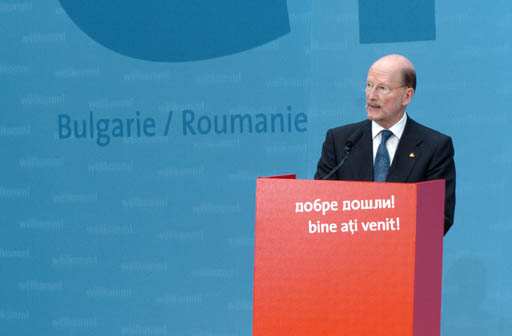The end of a long journey, the signing of the accession treaty with Romania and Bulgaria

(Archives B2) It is 18:15 p.m. at Neumünster Abbey, in the center of the city of Luxembourg. The European anthem resounds, on a surprising rhythm, light, aerial, under the leadership of the " Mystery of Bulgarian voices ". Applause erupts in the rectangular courtyard. Each of the countries is then called in alphabetical order to come to the stage to sign a new Treaty of Accession... this time for Bulgaria and Romania.
The end of a long journey
Simeon of Saxe-Coburg, Bulgarian Prime Minister, particularly moved, cannot help but appeal to the ideal of the founding fathers of Europe. " It is undeniably one of the greatest events in the history of our country. Bulgaria joins the community of European peoples which is its own. (...) Bringing together the peoples of Europe was not the ambition of the founders of Europe. We are taking another step towards the reunification of the continent. It is not just a treaty between states. It is above all the union between citizens that we make ».
While his Romanian counterpart, Traian Basescu, uses the famous historical formula: "We come back “, adding” Thank you Europe »
Europe will have 27 States in 2007
The accession treaty of Romania and Bulgaria which has just been signed - and which still has to be ratified in the 27 States concerned - brings to an end several years of negotiation and some periods of tension. Romania and Bulgaria — the last of the twelve Central and Eastern European countries to which Europe had promised membership — should join the 1er January 2007. " should because, as the European Commissioner responsible for enlargement, Olli Rehn, reminded us, " the authorities of these two countries cannot rest on their laurels. A lot of work awaits them in 2005 and 2006 ».
Many points still to be settled
Not everything will be settled yet. Because especially from an economic and social point of view, the situation in these Black Sea countries is not brilliant. The gross domestic product (GDP) per capita is the lowest in Europe, reaching only 30% of the Community average. And many points still need to be improved. The fight against organized crime and corruption undermines these two Black Sea countries. The reform of the judicial system is still in its infancy. The rights of minorities and gypsies are not well guaranteed, especially in schools and hospitals. Finally, particularly in Romania, the public subsidy regime is not really in line with competition rules. In order to avoid any surprises, Europe has also provided for a clause, allowing membership to be postponed if necessary. Decision normally taken unanimously by the 25 Member States, on the recommendation of the European Commission. This postponement clause will be facilitated for Romania. In some areas (competition, legal or criminal cases), the decision may be taken by majority.
As an observer now
Be that as it may, from today, the Romanian and Bulgarian ministers will take part in all the councils of ministers. As an observer, without the right to vote but with freedom of speech. Representatives of the Romanian and Bulgarian Parliaments will sit alongside their colleagues in the halls of the European Parliament. Europe will then have 22 languages… But, once is not custom, with Romania and Bulgaria, these are two States, with the will and the French-speaking faith pegged to the body which join the European Union. It's up to us not to disappoint them...
Other countries on the doorstep
The next enlargement will concern the Balkans, to which Europe has promised a “European future” just like Turkey, for that matter. Not everyone is at the same stage.
Three candidate countries
Three countries have already formally applied for membership. Negotiations in this direction should begin quickly for the Croatia, as soon as the thorny case of cooperation with the criminal tribunal for the former Yugoslavia for the “handover” of General Gotovina has been settled (possible membership by 2009). For the Turkey, the negotiations could start in October if a series of reforms – such as the penal code or religious freedom – are completed (no date of accession announced, around 2013-2015 no doubt). For the Macedonia, the Commission must submit a report before the end of the year.
Natural candidate Balkan countries
The other Balkan countries - including Kosovo - are still at the stage of negotiating an "association and stabilization agreement", a kind of first step towards membership: Albania since 2003. Serbia-Montenegro has just received the green light to begin such negotiations. Bosnia and Herzegovina is a little behind.
For the other countries to the east... in another century!
As for Ukraine, Moldova — and most countries of the former USSR — there is no question, for the moment, of integrating the European Union but only of weaving, within the framework of the new "neighborhood policy", closer economic and cultural ties.
(Nicolas Gros-Verheyde)
Enriched and completed version of an article published in Ouest-France, April 2005
